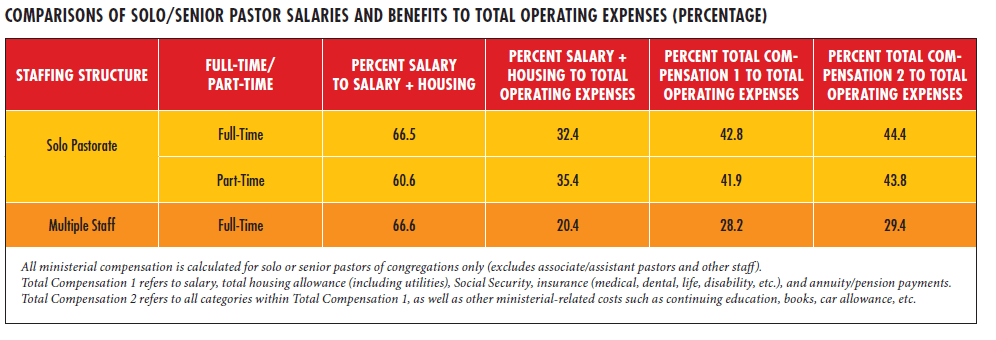Could bivocational ministry be the solution to balancing finances, calling, and interests? What if you’re a church plant currently raising funding? Or your church can’t afford to pay a full-time salary? In any of these scenarios, bivocational ministry could be the key to pursuing your calling.
Bivocational simply means that a person holds down two jobs simultaneously. For those called to ministry, one of those jobs may be serving as a pastor or church planter, and the other can be anything from teaching to delivering pizzas.
Let’s take a closer look at the various pros and cons of bivocational ministry and see whether it’s a path you should consider.
Estimated reading time: 15 minutes
Table of contents
Is Bivocational Ministry the Perfect Solution for Pastors?

Although it’s not a new trend, there has recently been a resurgence of interest in bivocational ministry. According to the Fall 2015 United Church of Christ Statistical Profile, solo pastors, whether full-time or part-time, have their salary package represented by about 44% of a typical church’s total budget. Depending on the size of the church and tithes and offerings, this is not very much money.

This can make bi-vocational ministry seem very appealing. And there are plenty of benefits, as shown later on in the article.
On the other hand, proceed with caution because there are some drawbacks and limitations. A bivocational role requires you to split your time and attention, which could have negative repercussions on your church and personal life.
As we dive into the conversation on the benefits and limitations of bivocational ministry, we readily admit there is no perfect solution.
Our modern western culture continues to pressure us to chase the mythical perfect work-life balance. We’re bombarded by promises that if we make the right moves and are more efficient, we can make tons of money while having more leisure time than we know what to do with.
But the reality is that work is hard. We rarely feel like we have enough time, and we often feel that we’re compromising one or more of our priorities to meet the demands of life.
As you consider your career path, start with prayer–and continue in prayer! The only way you can have peace in the storms of life is by walking with Jesus. If you’re on the path He has called you to, whatever that may be, you’ll have the confidence in what He’s called you to, even on the difficult days.
What Does the Bible Say About Bivocational Ministry?

Pastors have used the Bible to justify both full-time vocational ministry and bi-vocational ministry. Lets look at some scriptures to see how.
Acts
On the one hand, as the church was growing in the book of Acts, the apostles determined that preaching was a full-time job and other work might be a distraction:
“And the twelve summoned the full number of the disciples and said, ‘It is not right that we should give up preaching the word of God to serve tables. Therefore, brothers, pick out from among you seven men of good repute, full of the Spirit and of wisdom, whom we will appoint to this duty. But we will devote ourselves to prayer and to the ministry of the word.’” (Acts 6:2-4)
When Jesus sends out the 72, he instructs them to eat and drink whatever is given to them, “for the worker deserves his wages” (Luke 10:7). In addition, Paul echoes this principle in 1 Timothy 5:18.
However, passages in the book of Acts also point to the apostle Paul working as he ministered. So we see that he was bivocational at least some of the time!
Paul joins up with Priscilla and Acquilla in Acts 18:3, and “because he was of the same trade he stayed with them and worked, for they were tentmakers by trade.” Paul also notes in 2 Thessalonians 3:8 that he didn’t receive anything for free because he toiled night and day so that he would not be a burden to anyone.
1 Corinthians
You can also study more in 1 Corinthians chapter nine. In this chapter, Paul justifies his right to “receive a material harvest” (v 11) but also says he’s willing to forgo those rights if it allows him to offer the gospel free of charge.
So whether you’re considering bivocational ministry or want to dive into full-time, you can find justification for both paths in the Bible.
The Benefits of Bivocational Ministry

Employing bivocational pastors and ministry workers is nothing new for churches. We’re not just talking about senior pastors, either. Frequently, churches cannot pay a full-time salary for roles like student pastor, children’s minister, or worship pastor. Yet these roles are vital and require a substantial time commitment.
Let’s also clarify that a bi-vocational ministry worker doesn’t necessarily receive two paychecks. In some cases, the church may be able to offer a part-time salary or stipend. At other times, the minister may serve at the church in a weighty capacity without receiving any money. In this case, their other job is the only source of income.
When people are called to ministry but must face the reality of supporting their families, bivocational ministry may be the answer. Let’s look at the benefits for the church and the benefits for the minister.
Saving the Church Budget
The most obvious benefit of bi-vocational ministry is that it can help supplement a pastor’s income. This can be particularly helpful for pastors working in smaller churches or with large families.
Some churches are so small that they can’t afford a full-time pastor’s salary because giving is low or the budget is limited. In this case, having a bivocational pastor is necessary so the church can use the budget to cover basic operations costs.
In addition, the church and pastor may both feel a conviction to dedicate as much money as possible to ministry initiatives, benevolence, and missions. If the pastor takes a smaller salary, it allows more money for giving.
Connecting to Unbelievers
Another potential benefit of bi-vocational ministry is that it can help ministers connect with people who have never set foot in a church. Pastors with larger congregations can find that their calendars are full of meetings and lunches with current church members.
When ministers work in the secular world, they have more opportunities to interact with people who don’t go to church, whether they’re customers or co-workers.
Immersing yourself in the community outside the church can be a great way to build relationships and share the gospel. In addition, the minister can build trust and credibility with the community.
Connecting and Staying Relevant
Having a “real-world” job also helps ministers stay relevant. Pastors can easily become disconnected from the struggles, joys, and challenges people experience in an everyday working environment.
When you’re part of the workforce, you can better empathize with the people you’re pastoring and understand how the gospel applies to their lives.
It’s also a way to keep your finger on the pulse of culture. You can see how people are living and what issues they’re facing. This can help you address those issues in a relevant way from the pulpit.
Finally, the skills you hone in the marketplace may inspire innovative ways to do ministry and give you the practical know-how to execute. You learn the latest in technology, leadership, and more in the modern workplace.
Freedom to Preach Truth
Although it’s sad, many full-time pastors can get pulled into church politics. They may feel compelled to appease influential members influential or significant donors.
When you’re not dependent on the church for your income, you have more freedom to preach the truth, even if it will ruffle feathers. You don’t have to worry about offending people or losing your job because these same folks are paying your salary.
This can be a great way to keep the church focused on biblical principles and gospel proclamation. However, please don’t use it as an opportunity to be a loose cannon or sow division. As the Bible says, “If it is possible, as far as it depends on you, live at peace with everyone.” (Romans 12:18)
Serving as an Example
How often have you heard a pastor say, “We’re all in ministry!” While it’s easy for pastors to preach this from the pulpit, it can also be easy for people to shrug off.
When you’re working a regular job, you have the opportunity to serve as an example to other believers. You can show them that ministry isn’t just something that happens inside the church walls on Sundays.
Walking as a faithful follower of Christ in a secular environment allows you to lead by example and encourage others to find ways to minister in their workplaces.
Flexibility and Variety
Working one job for 40+ years is fast becoming the exception. According to the U.S. Bureau of Labor Statistics, the average person has over twelve jobs in their lifetime. And many futurists say that number is on the rise.
If you’re the type of person who loves change, then bi-vocational ministry might be a good fit and give you more flexibility in your schedule. Of course, this benefit can also be a drawback. The constant change can be stressful and overwhelming. You may never feel genuinely settled or have a “home base.”
Finally, bivocational work can be fun and fulfilling. It can provide a much-needed break from the demands of ministry and allow a pastor to use their gifts and talents in new ways.
The Drawbacks to Bivocational Ministry

Now that we’ve covered the many positive aspects of bi-vocational ministry, let’s consider some drawbacks.
Time-Consuming
When you work two jobs, you have less time for your family, friends, and personal interests. You also have less time to prepare sermons, meet with church members, and do the administrative work of the church. In some cases, this can lead to pastor burnout.
Juggling two or more jobs often means that bivocational pastors have less time to dedicate to their church responsibilities. This can include sermon preparation, pastoral care, counseling, and church administration. As a result, the quality and depth of their ministry may be compromised. Juggling two or more jobs often means that bivocational pastors have less time to dedicate to their pastoral responsibilities. This can include sermon preparation, pastoral care, counseling, and church administration. As a result, the quality and depth of their ministry may be compromised.
Financial Uncertainty
Bi-vocational ministry can still be a financial strain. You may not be able to live as comfortably as you could on a single salary. Or you may be missing out on full-time benefits like healthcare and retirement. Sometimes, you may have to find additional income streams to make ends meet.
Bivocational pastors may have limited opportunities for career advancement and income growth in their secular job because they prioritize their ministry responsibilities. This can result in slower financial progress compared to individuals solely focused on their secular careers.
Additionally, the secular job that a bivocational pastor holds may not always align with their values and principles as a pastor. Conflicts may arise if the pastor’s job responsibilities clash with their pastoral role or if their employer has expectations that differ from those of the church.
Conflicts of Interest
You may feel constantly pulled in two (or more) opposing directions. This can be very stressful for some personalities because it’s challenging to focus, and you may feel like you’re always letting someone down.
When a bivocational pastor is in a position of decision-making authority at their secular job, they may encounter conflicts when their decisions impact church members or the congregation. Balancing the best interests of their secular employer and their congregation can be challenging.
To manage conflicts of interest in bivocational ministry, bi-vocational pastors should communicate openly with both their church leadership and their secular employers about their roles and responsibilities to avoid misunderstandings. They should establish clear boundaries between secular and pastoral duties to prevent conflicts. Pastors should determine when and how they will be available for church activities and communicate this to both their congregation and employer.
When you immerse yourself in a secular environment, you must be careful to stay strong in your convictions and biblical worldview. You can easily be swayed and influenced by popular culture when it’s the norm you’re surrounded by. As a pastor, you’re called to be set apart and live a holy life. Make sure you’re on a path that won’t compromise your character and values.
Neglecting Self-Care
Bi-vocational pastor roles may prioritize the needs of their congregation and job responsibilities over their own physical and mental health. Neglecting self-care can lead to health issues and decreased effectiveness in ministry. Many bivocational pastors are deeply dedicated to their congregations and ministries, and this commitment can sometimes lead them to put the needs of others ahead of their own, neglecting their physical and emotional well-being.
Neglecting self-care can contribute to health problems, including sleep disorders, high stress levels, and physical ailments, all of which can affect a pastor’s overall well-being. To prevent neglecting self-care in ministry, a bi-vocational pastor should recognize the importance of self-care and prioritize it as an essential aspect of their ministry. It’s not selfish; it’s necessary for long-term effectiveness.
New Options for Bi-Vocational Pastors

Bivocational ministry has become increasingly common as pastors seek to balance their pastoral roles with secular employment. With the rise of technology and remote work, being a bivocational pastor may be easier than ever before.
There are several new options and strategies that can help bi-vocational ministers navigate their roles more effectively and address the challenges they face:
General Ideas
- Part-Time Ministry Positions: Some churches and denominations are creating part-time ministry positions designed specifically for bivocational pastors. These roles come with reduced responsibilities and time commitments, making it easier to balance with secular employment.
- Bi-Vo Church Models: Some churches are adopting the “bi-vocational church” model, where multiple pastors or leaders share ministry responsibilities, allowing each to maintain secular employment. This approach can distribute the workload and provide greater flexibility.
- Tentmaking Ministry: Tentmaking ministry involves using one’s secular job or skills as a platform for ministry. Bivocational pastors can intentionally choose secular employment that aligns with their ministry goals, allowing them to combine both roles effectively.
- Ministry Networks: Joining ministry networks or associations that support bi-vocational pastors can provide access to resources, mentorship, and opportunities for collaboration and support.
- Hybrid Roles: Some bi-vocational pastors are taking on hybrid roles that combine elements of ministry and secular work. For example, a pastor with a background in counseling might work part-time as a therapist while also serving as a pastoral counselor within the church.
- Community Partnerships: Bivocational pastors can explore partnerships with local businesses, organizations, or educational institutions to create opportunities for ministry and community outreach that align with their secular employment.
Technology Ideas
- Remote Work: The growth of remote work options, especially in the wake of the COVID-19 pandemic, has created opportunities for bivocational pastors. They can now work remotely, allowing for greater flexibility in managing their time and ministry responsibilities.
- Online Ministry: Bivocational pastors can explore online ministry options, such as starting a church website, hosting virtual Bible studies, or offering pastoral counseling online. These platforms can expand their ministry reach without the need for a physical church building.
Financial Ideas
- Alternative Income Streams: Exploring additional income streams, such as writing books, teaching seminars, or offering coaching services, can supplement a bi-vocational pastor’s income while allowing them to pursue their ministry calling.
- Financial Planning and Support: Seek financial planning guidance to manage income and expenses effectively. Some denominations and organizations offer financial support or resources for bivocational pastors.
- Continuing Education: Bivocational pastors can engage in continuing education and professional development to enhance their skills both in ministry and their secular job, potentially leading to better career opportunities.
It’s important for ministers bi-vocational pastoral ministry to communicate openly with their congregations, church leadership, and secular employers about their dual roles, boundaries, and expectations. Additionally, they should regularly assess their well-being and seek support when needed to ensure a healthy work-life balance.
The landscape of bi-vocational ministry continues to evolve, and pastors have more options than ever to effectively serve their congregations while managing their secular employment. Adaptability, creativity, and a strong support network are key factors in making a bi-vocational pastoral ministry successful.
Summing Up Bivocational Ministry

So, is bi-vocational ministry right for you? Only you can answer that question. Consider the pros and cons carefully and pray for guidance from the Holy Spirit. Don’t be afraid to leap if you feel called.
To make bivocational ministry work effectively, pastors and congregations must carefully consider the pros and cons, set clear boundaries, prioritize self-care, and seek support when needed. The suitability of bi-vocational ministry depends on individual circumstances, the needs of the congregation, and the pastor’s calling, and it is essential to strike a balance that allows the pastor to serve effectively while maintaining their well-being and fulfilling their other responsibilities.
Remember that you’re not meant to burn the candle at both ends. Whatever you decide, ensure you incorporate rest, Sabbath, and can prioritize your health and your family ahead of work.
We hope this post helps you explore the path of bi-vocational ministry from different angles. However, at the end of the day, let prayer guide your final decision. Whether you volunteer on weekends, go into full-time ministry, or find yourself in bi-vocational ministry, know that God is with you every step of the way.
What are your thoughts on bivocational ministry? Let us know in the comments below!





Comments 2
This material is relevant to all Christians especially pastors and other Church leaders.
Thank you for sharing, we believe it’s an important topic to discuss!